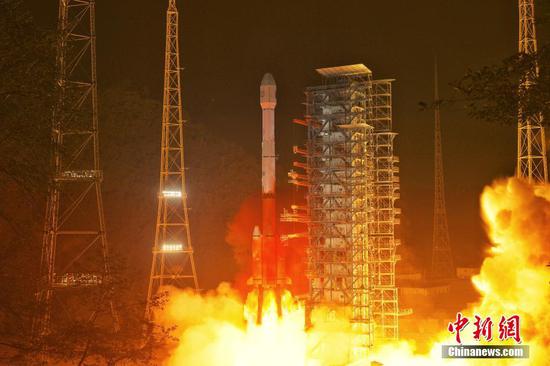A Chinese government-backed industry body on Sunday issued a white paper on 6G technology, highlighting applications and potential key technologies for the next generation of wireless technology that could be 10 times faster than the peak speed of 5G mobile networks.
The paper will give industry players a clear guide and a head start on the research and development (R&D) plan for 6G - which is expected to be commercially available around 2030 - amid an intensifying tech race between China and the US, analysts said.
While Washington has been seeking to reclaim its lost ground in the telecommunications sector in the coming 6G era, industry observers noted that it is highly likely that China's generational leadership in 5G would be extended to 6G, giving it a greater say in the telecom domain that could potentially reshape global technological and economic gravity.
The white paper provides an overall vision, and it also addresses eight business application scenarios, 10 potential key technologies, and views regarding the sector's development, the China Academy of Information and Communications Technology (CAICT)'s IMT-2030 6G promotion group, which released the document, said on Sunday.
According to the white paper, 6G services will have three major new development trends - immersive, intelligent and universal - and eight business application scenarios, including immersive cloud XR, holographic communication, sensory interconnection, intelligent interactive communication, digital twins, and global coverage.
Immersive services can be widely applied in fields such as entertainment, medical care, health and industrial production to support the digital transformation and upgrading of industries, the white paper said.
The white paper also listed 10 key potential technologies for the development of 6G technology, which will greatly improve the network performance, meet the needs of new businesses, and create new scenarios for social development, said the CAICT.
The white paper will play a guiding role for the industry, especially for the development direction of enterprises that are about to make investments, an industry expert surnamed Ma told the Global Times on Sunday.
He added that the white paper is also a summary of both China's current 6G R&D and its shortcomings in 5G technology that the country aims to make up for in the 6G era.
For example, the development of 6G will help deliver a more realistic and optimal experience for some business application scenarios such as intelligent transportation and smart healthcare, which have not been able to fully operate during the 5G era due to the lack of technology development, according to Ma.
The white paper was also issued at a time when China is carrying out 6G research in full swing. China started 6G research as early as around 2019, which was earlier than the US, the Global Times learned.
Work on 6G development started with spectrum options - which are deemed as the basis for 6G network infrastructure. A research staffer at China Mobile told the Global Times that the telecom operator has been testing terahertz waves and visible light as potential spectrum selections.
In the nationwide 6G push, developing self-reliant technology from the bottom up to be less reliant on patents developed by foreign companies is another task taking priority at Chinese telecom providers, the researcher said.
"During the 5G rollout, China is still subject to 'bottleneck technologies,' but in the 6G era, we aim to build our own network system," the person said.
Analysts pointed out that China has a clear edge in the global 6G race. According to Ma, China does not have any gap in technology from the generations of 3G to 5G, and this will be exactly the same when it comes to developing 6G.
"China does not have any serious shortcomings in research and equipment, and can conduct experiments and explore the technology by itself, with the ability to even conduct some relatively large-scale preliminary experiments, which will give China greater influence when setting the final standards for 6G," Ma said.
China Unicom and Chinese telecom equipment producer ZTE announced in May that they had agreed to research and develop 6G network under a cooperation pact. They will discuss 6G prospects and technology trends, research key 6G technologies and cooperate on standards, according to Chinese industry news website c114.com.cn.
The US, on the other hand, has already lost ground in 4G and 5G technologies, analysts noted, while pointing out that its 6G agenda also seems to be fairly slow.
In October, the Alliance for Telecommunications Industry Solutions, a US telecom standards developer whose member include technology behemoths like Apple, Qualcomm, Google, AT&T, launched the Next G Alliance to "advance North American leadership in 6G," the Bloomberg reported.
"The US excels in information technology, but it is short of core technologies and industrial equipment, which could further weigh on its 6G tech progress," Ma noted.


















































